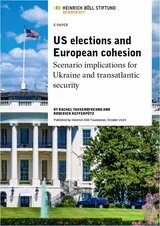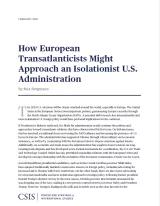As Britain reaffirms its support for Ukraine, changing geopolitical dynamics are testing the resilience of Western alliances. Amid growing concerns over support from key allies, the UK navigates complex decisions on defence commitments and NATO’s future. This article explores the UK's evolving stance, its recent defence collaborations, and the potential challenges ahead as Britain balances solidarity with Ukraine against the backdrop of a dynamic global landscape.

On paper, Britain’s support for Ukraine — ‘whatever it takes’ — is as firm as ever. Keir Starmer met Voldymyr Zelensky at No 10 in early October and reiterated how important it was for Russia to be defeated. The government’s stance has not materially changed since Starmer won office in July. "We're absolutely united in our resolve, and we'll back Ukraine for as long as it takes," Starmer said after a strategic meeting with his US, German and French counterparts in Berlin in mid-October. But ever since Ukraine’s incursion into Russia last summer yet again failed to change the course of the war, the mood in the UK has become steadily more pessimistic.
That is not just because Donald Trump has been re-elected, though this puts US support for Ukraine in deep jeopardy. Britain has also failed to convince all its allies that Ukraine should be able to fire Storm Shadow missiles into Russia. Notably, Joe Biden has been unconvinced.
Storm Shadow is an expensive Franco-British cruise missile with a 250km range. Italy and the US are also involved in manufacturing it, which means they would have to acquiesce to its use in Russia. So far Ukraine only has permission to use it on the Ukrainian territory that Russia has invaded, rather than the bases in Russia from which missiles are fired at Ukraine. According to the secretary general of NATO, Mark Rutte, it is legally possible for Ukraine to fire Storm Shadow into Russia, but individual allies must agree to it. Vladimir Putin has warned that doing this would amount to a NATO attack and that he would retaliate against targets within NATO countries. In turn, some fear, this could trigger Article 5 and lead to outright war with Russia.
However, Britain is thought to be willing to take that risk. “My understanding is if the US had not been denying permission for Storm Shadow, then the UK would have told the Ukrainians to go ahead as they wish,” says Ian Bond, the deputy director of the Centre for European Reform.
He warns that the fear of escalation can itself lead to more escalation. “If you say very loudly, ‘I’m terribly worried about the threat of escalation’, you incentivise Putin to escalate.’ The Russian dictator is practised at using Western fears to achieve his own ends.
Support for Ukraine shows signs of eroding
Public support for Ukraine is still fairly high in Britain, but lower than it was. The British Foreign Policy Group’s recent survey found that almost half thought the UK should support Ukraine ‘for as long as it takes’ (down from 53 percent in 2023). But 37 percent think it should be encouraged to seek a peace deal with Russia, and that figure increases among younger people.
The biggest defence think-tanks in the UK have been solid in their support for the government’s commitment, with RUSI, Chatham House, and the Council on Geostrategy all pushing the US and Germany to go further. The Council has been pressing for deeper cultural and business links with Ukraine in an effort to prop up its economy. In recent weeks there has been growing pessimism about Europe’s commitment to the cause. Tim Willasey-Wilsey of RUSI recently wrote of Ukraine’s ‘impending betrayal’ by the West, arguing that the crisis in the Middle East and the US election have distracted world leaders: “It proved too convenient to rely on US largesse. This made Europe a prisoner of US electoral factors. It also caused Europe to shirk the difficult decisions that helping win the war entailed.”
The future of the NATO alliance
If there is a peace deal, he says, European countries must at least ensure that NATO membership for Ukraine is part of any agreement. But Starmer failed to persuade the Quad to agree to that, with both Joe Biden and Olaf Scholz opposed. It seems extremely unlikely Trump will agree either. Indeed, it is possible he will quite the alliance altogether.
And it is questionable whether a NATO enfeebled by the departure of the US — or a lukewarm commitment to European defence under Trump — would give a shrunken Ukraine the kind of security it wants, particularly if Putin uses the hiatus to re-arm and regroup his soldiers. On the other hand, without a NATO guarantee, the Russian dictator is even more likely to invade again.
Britain also worries about losing German financial support for Ukraine, which has been considerable. The collapse of Germany’s ruling coalition and the likelihood of elections in the next few months increase the uncertainty, as does rising support for the far-right Alternative for Deutschland and the populist left party Alliance Sahra Wagenknecht. These have attracted a lot of coverage in Britain, which usually takes very little interest in German politics.
But if Germany and the US do withdraw support, says Bond, “Keir Starmer will still find himself aligned with the Baltic states and Poland. It’s not like he would find himself isolated. My sense is there is still pretty firm support in the government for doing what we’re doing — but not necessarily for doing much more.”
After Ukraine
Like other countries, Britain has accepted Ukrainian refugees. Relative to its population, it has taken in relatively few (359 per 100,000 residents, compared to Germany’s 1,405), although the public perception is that the Homes for Ukraine sponsorship scheme was a generous offer at a time of high immigration from other countries. There are thought to be around 160,000 Ukrainians living in the UK, two-thirds of whom want to stay even if it safe to return. Their leave to remain will begin to expire from early 2025. The government is offering them the right to apply for an 18-month extension, but after that they will still not be eligible to apply for British citizenship. Given that many of the children are educated in British schools and no longer speak Ukrainian fluently, the government will need to decide whether the implicit assumption that they will return is reasonable.
Ultimately, Britain’s ability to support Ukraine without the heft of the US will be limited. But if, as seems increasingly possible, Ukraine agrees to some sort of peace deal, the UK may decide to redouble its commitment to NATO and European defence. October’s landmark defence agreement with Germany suggests the UK is already thinking along these lines. It promises collaboration on long-range missiles which could travel further than Storm Shadow, joint army exercises, the integration of air defence systems and a new focus on protecting underwater cables in the North Sea.
The UK has also signed a new defence agreement with Estonia which will put the British Army’s 4th Brigade on standby to deploy to Estonia from next summer. Britain has also pledged to invest in new long-range missiles with Poland, France and Italy.
The UK is now turning its attention towards defending NATO’s border with Russia. “As long as it takes” is still the official rhetoric, but Britain knows that it might soon be forced to switch focus.
The views and opinions in this article do not necessarily reflect those of the Heinrich-Böll-Stiftung European Union.


